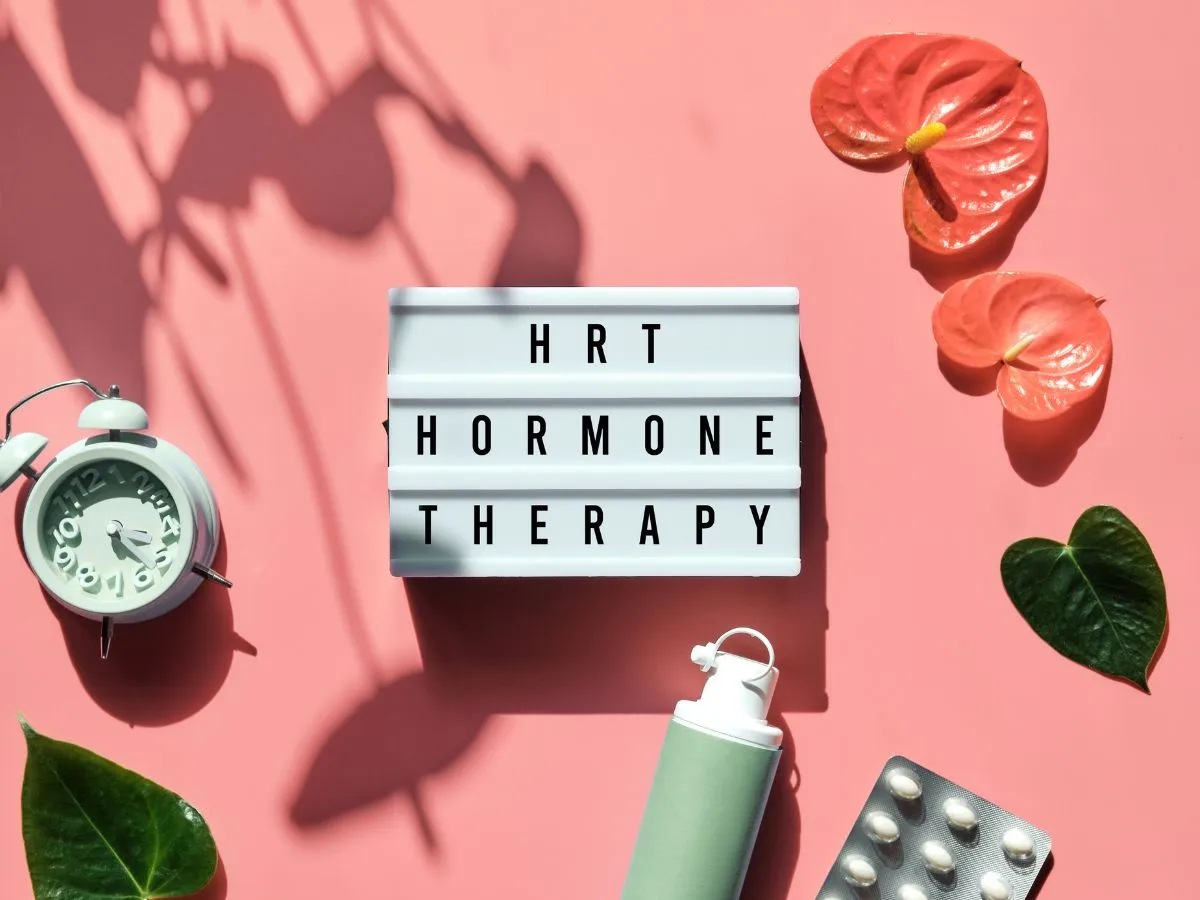Exploring the Transformative Benefits of Hormone Replacement Therapy (HRT) for Menopause
Menopause is a natural biological process that marks the end of a woman's reproductive years. While it is a normal transition, the symptoms associated with menopause can be challenging and impact the quality of life and longevity for many women.
Hormone replacement therapy (HRT) has emerged as a widely recognized treatment option for managing menopausal symptoms and improving overall well-being. Here we get into the transformative benefits of hormone replacement therapy for menopause and explore how it can empower women to navigate this significant life transition with greater ease and comfort.

Understanding Menopause and Hormone Changes:
Before delving into the benefits of hormone replacement therapy, it's essential to understand the hormonal changes that occur during menopause and the resulting symptoms. Menopause typically occurs between the ages of 45 and 55, although the timing can vary for each woman. During menopause, a woman's ovaries gradually produce less estrogen and progesterone, leading to hormonal fluctuations and eventually the cessation of menstruation.
Common symptoms of menopause can include:
- Hot flashes
- Night sweats
- Mood swings
- Sleep disturbances
- Vaginal dryness
- Decreased libido
- Cognitive changes
These symptoms can have a significant impact on a woman's quality of life, affecting her physical health, emotional well-being, and relationships.
The Role of Hormone Replacement Therapy (HRT):
Hormone replacement therapy involves supplementing the body with synthetic or bioidentical hormones to alleviate menopausal symptoms and restore hormonal balance. HRT typically consists of estrogen alone (for women who have had a hysterectomy) or a combination of estrogen and progesterone (for women with an intact uterus) to mimic the hormonal levels of premenopause.
While HRT has been a subject of controversy in the past due to concerns about its safety, extensive research over the years has provided valuable insights into its benefits and risks. For many women, the benefits of hormone replacement therapy outweigh the potential risks when used under the guidance of a healthcare provider.
The Transformative Benefits of Hormone Replacement Therapy:
1. Relief from Menopausal Symptoms:
One of the most significant benefits of hormone replacement therapy is the relief it provides from bothersome menopausal symptoms. Estrogen therapy can effectively reduce hot flashes, night sweats, vaginal dryness, and other symptoms that can interfere with daily life and disrupt sleep.
2. Improved Bone Health:
Estrogen plays a crucial role in maintaining bone density, and the decline in estrogen levels during menopause can increase the risk of osteoporosis and bone fractures. Hormone replacement therapy can help preserve bone density and reduce the risk of osteoporosis, especially when initiated early in menopause.
3. Protection Against Heart Disease:
Estrogen has cardioprotective effects, including improving cholesterol levels, reducing inflammation, and promoting healthy blood vessel function. Hormone replacement therapy may help lower the risk of heart disease and cardiovascular events in women who are recently menopausal or at increased risk of heart disease.
4. Enhanced Mood and Well-being:
Menopausal symptoms can take a toll on a woman's mental health and emotional well-being. Hormone replacement therapy can help stabilize mood, reduce irritability and anxiety, and improve overall quality of life for women experiencing menopausal mood disturbances.
5. Maintenance of Cognitive Function:
Estrogen has neuroprotective effects and plays a role in cognitive function and memory. Hormone replacement therapy may help preserve cognitive function and reduce the risk of cognitive decline and Alzheimer's disease in postmenopausal women.
6. Management of Genitourinary Symptoms:
Vaginal dryness, urinary urgency, and recurrent urinary tract infections are common genitourinary symptoms associated with menopause. Estrogen therapy can improve vaginal health, restore moisture and elasticity to the vaginal tissues, and alleviate urinary symptoms, enhancing sexual function and urinary continence.
7. Individualized Treatment Options:
Hormone replacement therapy is not a one-size-fits-all approach, and treatment plans should be tailored to each woman's unique needs and preferences. Healthcare providers can work with women to determine the most appropriate type, dose, and duration of hormone therapy based on their medical history, risk factors, and treatment goals. Given the research surrounding oral estrogen and the increased risk of blood clots and strokes, it is best to avoid this route and stick with a topical form.
In conclusion, hormone replacement therapy offers transformative benefits for women experiencing menopause, providing relief from bothersome symptoms, preserving bone health, protecting against heart disease, enhancing mood and well-being, maintaining cognitive function, and managing genitourinary symptoms. While hormone replacement therapy may not be suitable for everyone, it can be a valuable treatment option for women seeking relief from the challenges of menopause. By working closely with healthcare providers and making informed treatment decisions, women can embrace this significant life transition with greater ease and confidence. With the support of hormone replacement therapy, women can navigate menopause with grace and vitality, embracing the next chapter of their lives with optimism and resilience.
To embark on your path to wellness with Dr. Jen Hardie, ND, please click here. We look forward to assisting you in your health journey.
In Health,
Dr. Jen Hardie
Naturopathic DoctorReferences:
Freeman, E. W., & Sherif, K. (2007). Prevalence of hot flushes and night sweats around the world: A systematic review. Climacteric, 10(3), 197–214.
Santoro, N., Komi, J., & Prevalence of Vaginal Atrophy Symptoms: Results from the REVIVE Study. Menopause: The Journal of The North American Menopause Society, 21(9), 1063–1068.
Soares, C. N. (2013). Mood disorders in midlife women: understanding the critical window and its clinical implications. Menopause, 20(8), 853–857.
Compston, J. E., & Watts, N. B. (2018). Evaluation of the Fracture Risk Assessment Tool (FRAX®) as an Indicator of Treatment Thresholds for Postmenopausal Osteoporosis: A Review. Drugs & Aging, 35(1), 15–24.
Nelson, H. D., & Humphrey, L. L. (2002). Postmenopausal Hormone Replacement Therapy for Primary Prevention of Chronic Conditions. JAMA, 288(8), 872.
Boardman, H. M., & Hartley, L. (2015). Hormone therapy for preventing cardiovascular disease in post-menopausal women. Cochrane Database of Systematic Reviews, (3).
Hodis, H. N., & Mack, W. J. (2017). Hormone therapy and cardiovascular disease: The controversies and the facts. In Climacteric (Vol. 20, pp. 98–116).
Rocca, W. A., & Brinton, R. D. (2011). Is Hormone Therapy Protective for Alzheimer’s Disease and Cognitive Decline in Women? Alzheimer’s & Dementia, 7(3), e63–e75.
Shumaker, S. A., & Legault, C. (2003). Estrogen Plus Progestin and the Incidence of Dementia and Mild Cognitive Impairment in Postmenopausal Women. JAMA, 289(20), 2651.
